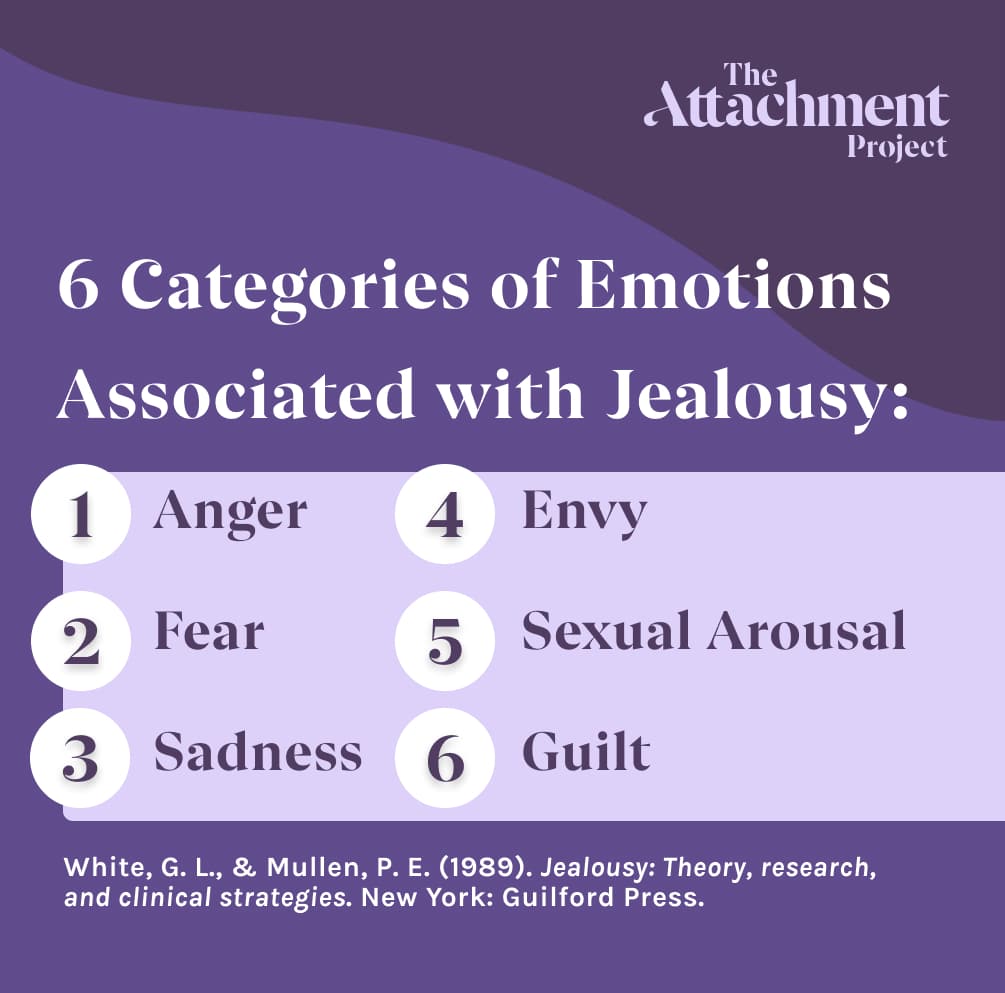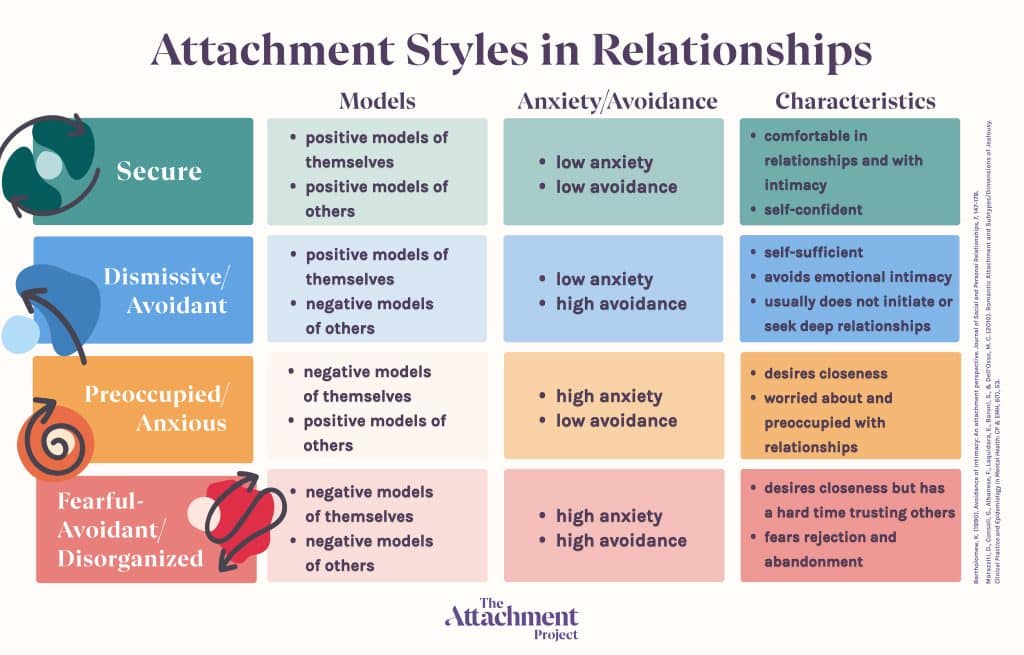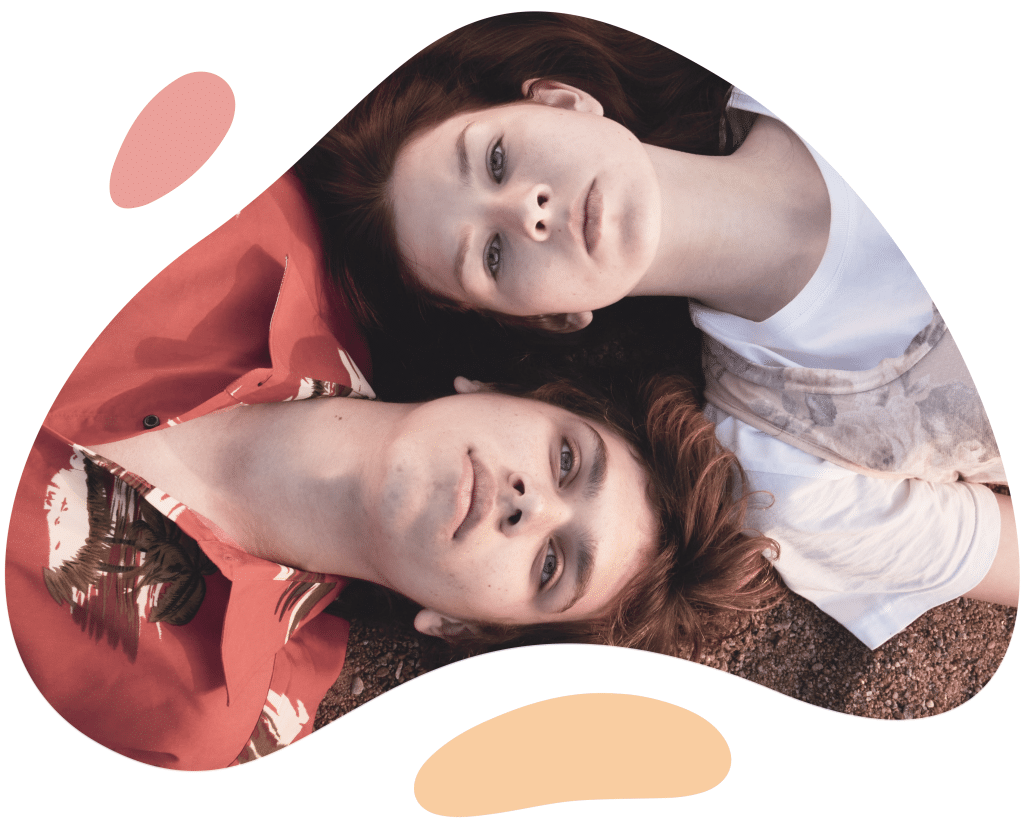Jealousy in Relationships: Do Attachment Styles Matter?

Published on December 12, 2021 Updated on August 20, 2023
Can our attachment styles influence the way we experience jealousy in relationships? Absolutely. On the one hand, emotions such as anxiety, fear, and insecurity – often caused by insecure attachment styles – can easily provoke jealousy. On the other hand, the sadness, anger, and even irrationality that can come about as a reaction to a perceived threat (these also vary across attachment styles) can decrease couple satisfaction and further harm relationships.
Investigating your attachment style and becoming aware of its effects on your personal life could be an essential step towards healthy, satisfying, and long-lasting romantic relationships.
Jealousy is a pretty common, and even evolutionary-purposeful phenomenon that finds its way into almost every relationship – especially intimate ones. Although it can be considered a way to “watch out for” your relationship, or even of demonstrating affection and passion, jealousy can have also have a dark and destructive side.
If you are wondering …
- whether you are the jealous type
- how much jealousy in relationships is considered normal and “O.K.”
- what factors cause individual differences regarding the experiences of jealousy
- which attachment styles are associated with jealousy and how
- whether gender has anything to do with jealousy
- how the digital age and online dating influence people’s jealousy in relationships
… then keep reading; you’ll find your answers in this blog post.
What Is Jealousy?
Jealousy embodies the set of thoughts, beliefs, emotions, and behaviors we experience when (we believe) our relationships are threatened.
Existing literature refers to the phenomenon of jealousy as having two main components: the experience and expression of it. The descriptions of both components are pretty straightforward:
1. The Experience of Jealousy

The experience of jealousy includes our thoughts (for example, trying to estimate whether a partner is interested in another person) and emotional reactions (for example, worrying, feeling insecure, or feeling sad or depressed).
Jealousy might be accompanied by a variety of negative emotions, and these emotions can be dependent on the form of the relationship that is affected; e.g romantic, friendship, or familial. Even though these emotions are usually context-specific, researchers have identified certain similarities and trends. One example of such patterns is the six categories of jealousy-related emotions, described by White and Mullen [5].
2. The Expression of Jealousy
Jealousy expression, as the name suggests, incorporates all the ways we demonstrate and communicate our jealousy; the jealousy-related thoughts and emotions. This, once again, can differ greatly between, and even within, individuals depending on the context.
Interestingly, that’s where attachment styles also come into play.
Why Do Attachment Styles Affect Jealousy in Relationships?
When we perceive that our relationships with loved ones are in danger, we feel threatened, and our attachment systems become activated. This activation means that the attachment traits, characteristics, behavioral patterns, and emotions associated with our attachment styles could reach their peak.
Another reason why jealousy is closely related to attachment styles is that both are strongly dependent on the way we perceive ourselves and others. Let’s first take a moment to review the associations between each attachment style and an individual’s view of themselves and others.
- People with secure attachment have a positive opinion of themselves and others. They typically exhibit low levels of attachment anxiety and avoidance. Also, they are self-confident, invested, and comfortable in relationships.
- People with dismissive/avoidant attachment tend to have a positive view of themselves and a negative opinion of others. They score low on anxiety but high on avoidance. Furthermore, they perceive themselves as self-sufficient but feel threatened by closeness and emotional intimacy.
- People with preoccupied/anxious attachment have a negative view of themselves but a positive opinion of others. They experience high levels of anxiety and low levels of avoidance. Additionally, they desire close relationships but are typically worried about and preoccupied with their relationships.
- People with fearful-avoidant/disorganized attachment have a negative view of themselves and others and exhibit high anxiety and high avoidance. They desire close contact with others but tend to lack trust in others and fear abandonment and rejection.

Still don’t know your attachment style? Take our free quiz and find out in just 5 minutes!
How Do Attachment Styles Influence Jealousy?
I. Attachment influences our beliefs and expectations about ourselves and our relationships – and these factors have a strong impact on jealousy
To begin with, jealousy in relationships depends on our beliefs and expectations about ourselves and our partners, and these have been linked to attachment styles in existing research [1]. For instance, people who think of themselves as inadequate partners, and who perceive their partners as less involved, experience higher levels of jealousy [8].
Furthermore, self-esteem is associated with both jealousy experience and jealousy expression [2].
Low self-esteem often leads to harsh negative self-talk and self-judgment. Individuals who suffer from low self-esteem (such as many anxious and disorganized attachers) might experience more worries related to jealousy in relationships. Additionally, research has found anxious attachers partners to be most likely to engage in surveillance behaviors, thus indicating a potential link between low self-esteem and jealousy expression.
On the contrary, people who have high self-esteem but view others in a negative light are more likely to deal with jealousy through avoidance and denial.
Interestingly, studies that have investigated the tendency to induce jealous reactions within a relationship [9] hypothesized that it could actually enhance self-esteem. For instance, insecurely attached individuals, especially the anxiously attached, were more likely to try to elicit jealousy in their partners through a variety of methods.
II. Attachment styles are associated with different ways of experiencing and expressing jealousy
Studies have found that people with different attachment styles report different levels of fear, anger, and sadness when dealing with jealousy [1]. How intensely and frequently people experience jealousy in relationships is also linked to attachment styles.

For instance, people with a secure attachment style are more confident and, thus, more likely to express anger towards their partners in a healthy way, instead of bottling it up. Anxious attachers are just as likely to feel anger and irritability as secure people. They are, however, considerably less likely to express it – probably due to feelings of inferiority and fear.
Preoccupation with relationships also impacts whether and how we experience jealousy.
Even though being concerned about maintaining your relationship is not at all a bad thing, it could lead to potential issues when taken to an extreme.
Anxious attachers, and sometimes disorganized attachers, are prone to becoming preoccupied with relationships. For instance, they might pay a lot of attention to small details of what their partners said or did and analyze the meaning behind those details. Additionally, they are more likely to overthink their relationships and have more excessive jealous thoughts. Such individuals tend to be fearful of losing their partners and very sensitive and self-reflective regarding their own perceived deficiencies in respect to their partners [4].
Preoccupation with preserving a relationship is also likely to result in more attempts to induce jealousy in a partner.
Attachment differences can also be found in how people communicate their jealousy: disorganized individuals tend to use aggressive communication styles with their partners, while anxious attachers are more likely to use non-assertive communication.

What’s Gender Got to Do with It?

People often believe that gender explains certain individual differences in jealousy. Overall, they are not entirely wrong to assume so.
Even though jealousy is present both in men and in women, there seem to be gender-specific differences in how they experience it. While men tend to find sexual infidelity more distressing, women are more perturbed by emotional infidelity.
This difference could potentially be explained by evolutionary theories [4], despite the fact that some people consider this perspective to be old-fashioned and irrelevant.
However, another potential explanation can be drawn based on what we know about attachment styles. Whereas avoidant attachers are more distressed by sexual infidelity, securely-attached individuals are more distressed by emotional infidelity [10]. This could also partly explain the previously discussed gender differences, as avoidant attachment has been found to be more common in men than in women.
This insight based on attachment theory could impact initiatives designed to prevent violence linked to sexual jealousy – a leading cause of much domestic violence. Therefore, promoting secure attachment could be a new and effective approach to reduce and prevent sexual jealousy [10].
Attachment & Jealousy in Relationships – In the Digital Age
The digital age – social media and all of the online opportunities – has inevitably taken jealousy to a whole new level. It’s not that people are necessarily more jealous; yet, they are regularly inundated with considerably more reasons to be.
There is a wide range of ways to demonstrate our connection, affection, and interest in others online. With one click, we can have countless pictures and videos at our disposal, and we can gain knowledge of the habits and movements of almost anyone on earth. Overall, this has increased people’s awareness of infidelity and also their chances to experience and manifest jealousy.
Additionally, social media can also be used to monitor the online behavior of partners [12] and, resultingly, can create the so-called “cycles of jealousy” – e.g. seeing a Facebook image of your partner leads to digging into their profile, which in turn, increases feelings of jealousy, and so on [11].
Interestingly, peoples experience of jealousy caused by online factors also differs between the attachment styles.

For example, studies have demonstrated that showing people a Facebook image of their partners touching an opposite-sex friend elicited different reactions respective of attachment style [11]. Anxious attachers felt high levels of anger and fear, while avoidant and secure participants felt the least envy and embarrassment. Securely attached individuals had the most positive reactions overall, while anxious and disorganized participants had the strongest emotional responses to the scenario. In line with what we know about the avoidant attachment style, the latter was associated with the weakest emotional reaction to the jealousy-provoking scenario.
Research has found that those high in attachment anxiety experience more Facebook jealousy and engage in more surveillance of their partners. For instance, anxious attachers may be more likely to spy on their partners on Facebook. They also used Facebook to increase the visibility of their relationships. Additionally, anxious individuals exhibited the highest levels of anger and fear as a result of cues of infidelity online.
Overall, heavier social media users are most prone to jealousy in relationships, as social networks can increase people’s anxiety and fears. For instance, seeing public images of your partner with someone else can spark envy and facilitate negative self-talk. Also, the public nature of social media posts can lead to embarrassment and fear of criticism.
It is worth mentioning, however, that people’s attitudes toward online communication (for example, the extent to which they were concerned about misunderstandings online) could influence their experience of jealousy. Study findings suggest that negative attitudes towards communicating and engaging in online platforms might diminish the link between attachment anxiety and jealousy [12].
The Impact of Jealousy in Relationships & Take-Home Message
Generally, jealousy in relationships can decrease happiness and create distance in a couple. It is important to keep in mind that jealousy does not only affect the person who’s experiencing it: it also affects their partner negatively [7].
A new line of research focuses on how attachment styles impact the consequences of jealousy on relationships. This focus demonstrates the potential for improving relationships by promoting and raising awareness about the importance of secure attachment. By facilitating attachment security in couples, therapists can strengthen relationships, increase couple satisfaction, and even reduce the more extreme consequences of jealousy [7,10].
Are You Often Jealous in Relationships?
If you notice that you experience high levels of jealousy in relationships, we recommend you seek psychological help. Even though jealousy is not a mental disorder, therapy could help you identify the mechanisms that underpin your experiences of jealousy and minimize unhealthy thoughts and behavioral patterns.
Curious to discover your attachment style?
Complete our FREE ATTACHMENT QUIZ in just 5 minutes and receive your attachment style report right away!

References
[1] Sharpsteen, D. J., & Kirkpatrick, L. A. (1997). Romantic Jealousy and Adult Romantic Attachment. Journal of Personality and Social Psychology, 72(3), 627–640.
[2] Guerrero, L. K. (1998). Attachment-style differences in the experience and expression of romantic jealousy. Personal Relationships, 5(3), 273–291.
[3] Bartholomew, K. (1990). Avoidance of intimacy: An attachment perspective. Journal of Social and Personal Relationships, 7, 147-178.
[4] Marazziti, D., Consoli, G., Albanese, F., Laquidara, E., Baroni, S., & Dell’Osso, M. C. (2010). Romantic Attachment and Subtypes/Dimensions of Jealousy. Clinical Practice and Epidemiology in Mental Health: CP & EMH, 6(1), 53.
[5] White, G. L., & Mullen, P. E. (1989). Jealousy: Theory, research, and clinical strategies. New York: Guilford Press.
[6] Knobloch, L. K., Solomon, D. H., & Cruz, M. G. (2001). The role of relationship development and attachment in the experience of romantic jealousy. Personal Relationships, 8(2), 205–224.
[7] Dandurand, C., & Lafontaine, M.-F. (2014). Jealousy and Couple Satisfaction: A Romantic Attachment Perspective. Http://Dx.Doi.Org/10.1080/01494929.2013.879549, 50(2), 154–173.
[7] Dandurand, C., & Lafontaine, M. F. (2014). Jealousy and couple satisfaction: A romantic attachment perspective. Marriage & Family Review, 50(2), 154-173.
[8] White, G. L. (1981). Relative involvement, inadequacy, and jealousy: A test of a causal model. Alternative Lifestyles, 4, 291-309.
[9] Wegner, R., Roy, A. R. K., Gorman, K. R., & Ferguson, K. (2018). Attachment, relationship communication style and the use of jealousy induction techniques in romantic relationships. Personality and Individual Differences, 129, 6–11.
[10] Levy, K. N., & Kelly, K. M. (2009). Sex Differences in Jealousy: A Contribution From Attachment Theory. Psychological Science, 21(2), 168–173.
[11] Miller, M. J., Denes, A., Diaz, B., & Buck, R. (2014). Attachment Style Predicts Jealous Reactions to Viewing Touch Between a Romantic Partner and Close Friend: Implications for Internet Social Communication. Journal of Nonverbal Behavior, 38(4), 451–476.











 Get mental health tips straight to your inbox
Get mental health tips straight to your inbox








